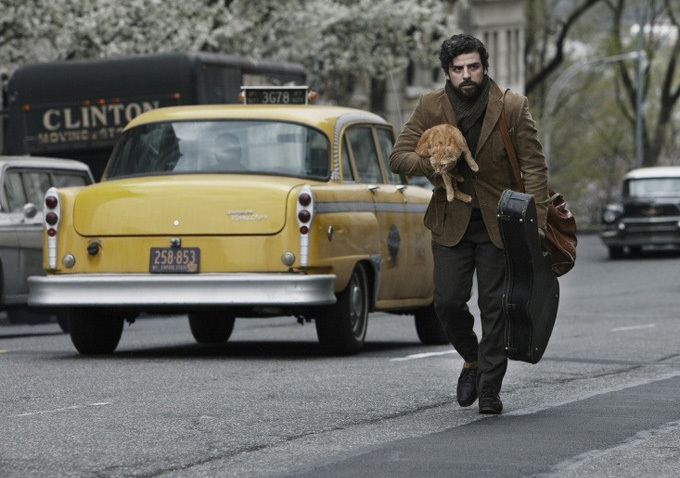In many ways, Inside Llewyn Davis seems like a matured rebuttal to the Coen brothers’ earlier film, O Brother, Where Art Thou? (2000). Whereas their earlier film focused on the strength of companionship, perseverance, and reward through the confident pursuit of an end goal, Inside Llewyn Davis presents the story of an isolated man who is visibly worn by sorrow and frustrated by past failures and grievances. At several points in the movie, Llewyn reminds us of his former music partner’s passing, a tragic event that he seems unable to circumvent, and likely the catalyst provoking his bad mannered, explosive temper. However, Llewyn never really opens himself up to anyone in the film in an attempt to bring closure to his troubling past, which makes the title of his latest album, “Inside Llewyn Davis,” rather ironic.
Another huge topic tackled by the film deals with the issue of deciding whether to keep true to your artistic roots, even if that means experiencing failure, or to make commercial compromises for the betterment of your career. Although the latter option was virtually out of the question for Llewyn, at one point in the film, he did agree to be a session guitarist for the recording of a goofy single entitled “Please Mr. Kennedy,” which seemed destined to be a hit. However, perhaps out of both desperation for money and the fear of “selling out,” Llewyn forgoes any claim to royalties in exchange for a larger amount of money upfront. With that said, in some respects, Inside Llewyn Davis seems slightly allegorical to the Coen brothers’ decision to make this film. Although they certainly possess enough talent that they could opt to “sell out” and turn a huge profit, they decided to instead create a movie that feels very comparable to some of their critically acclaimed earlier films, like Barton Fink (1991) or Fargo (1996), knowing fully well that “failure” (or at least less recognition) was likely.
Although Inside Llewyn Davis has many powerfully striking scenes of devastating circumstances, the film really hits hard with a subplot involving Llewyn’s interactions with the Gorfein’s cat (one of the families who lets Llewyn sleep at their house). Through the ongoing saga of the Gorfein’s missing cat, the Coen brothers successfully communicate Llewyn’s desire to alleviate his troubled conscience from the problems he has caused, heighten the dramatic tension of Llewyn’s chaotic life, and echo the journey motif through the travels that the cat itself undergoes (fittingly, the cat is also named Ulysses).
Personally, I also found the musical performances in the film to be particularly vital in capturing its intended message. Although Llewyn never allows his sorrows to be fully disclosed, the little that we do know of Llewyn’s humanity and past circumstances are revealed most clearly through the words of his songs. Moreover, although Llewyn himself is rather unlikeable, his songs manage to evoke moments of peace and comfort, which reveals what I consider to be the central theme of the movie; although humans are often selfish and fallible, somehow we remain capable of expressing beauty through our songs and stories.


 RSS Feed
RSS Feed
